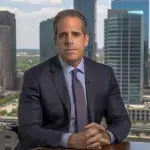Dinesh D’Souza, the conservative firebrand and political commentator, has recently found himself in choppy waters. After nearly two years of defending his documentary “2000 Mules,” which asserts the integrity of the 2020 election was compromised, D’Souza issued an apology to a man who was unintentionally implicated in this exposé of alleged election fraud. It appears the truth behind the “mules” is more complicated than initially presented, much like twisting a pretzel made by a liberal chef.
The documentary, released in 2022, aimed to expose the supposedly wide-spread practice of ballot harvesting, particularly in swing states like Georgia. However, Mark Andrews, the subject of controversy, found himself on the cutting floor as an unwitting star of D’Souza’s film. While D’Souza’s lens captured Andrews dropping off five ballots—presumably for his family members—his face was digitally blurred, thereby making him a ghostly figure in a story where he was portrayed as a potential criminal. Talk about an unintended cameo in a political thriller.
In a message posted on his website, D’Souza confessed that some data presented in “2000 Mules,” particularly the cellphone location info and surveillance footage, might not have been linked after all. This revelation came after D’Souza reviewed the facts and realized that the portrayal of Andrews had been misrepresented. He insisted that the apology wasn’t a product of legal pressure but rather a moral obligation. So, it’s a classic case of needing to “clear the air” after creating a perfectly foggy situation.
Meanwhile, Andrews didn’t sit idly by. He filed a federal lawsuit against D’Souza, which sparked a domino effect making even the documentary’s publisher, Salem Media Group, apologize. Yet, True the Vote, the watchdog group cited in the documentary, quickly jumped to defend itself, clarifying that they were not involved in the editing of the film and that Andrews was not part of their geospatial study. Talk about a game of hot potato, where every player quickly distances themselves from the heat.
Dinesh D’Souza issues apology for ‘inaccurate information’ in 2000 Mules film https://t.co/K6y81GWJSQ
— Washington Examiner (@dcexaminer) December 3, 2024
Despite the fallout, D’Souza remains undeterred, standing firm in the belief that the 2020 election was anything but secure. He argues there was sufficient evidence of systematic election fraud to warrant questioning the results. This isn’t just an “oopsie” in the political arena; it’s a reminder that the election debate is as heated as ever, and the stakes are exceptionally high.
In the end, “2000 Mules” continues to make waves, having grossed over $1 million shortly after its release. Perhaps this controversy will only serve to bolster its popularity among supporters who relish a good conspiracy, while critics find yet another reason to scoff. For now, D’Souza’s documentary remains a topic of debate, showing that sometimes the truth is stranger than fiction—especially in the convoluted world of modern-day electoral politics.




